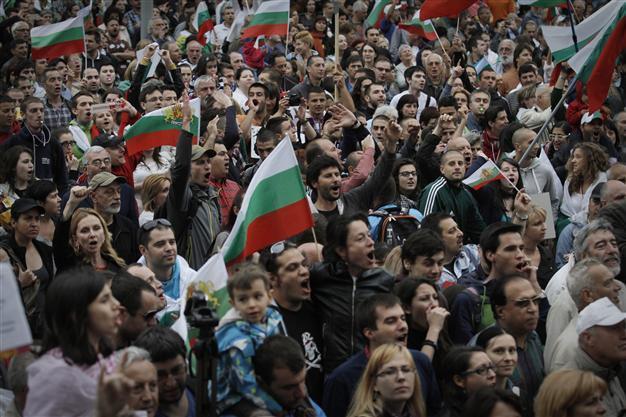Embattled Bulgaria PM urges calm, says ready for talks
SOFIA, Bulgaria - Agence France-Presse

Protesters shouts anti-governmental slogans in downtown Sofia, late Wednesday, June 26, 2013. AP Photo
Embattled Bulgarian Prime Minister Plamen Oresharski on Thursday urged protesters demanding his resignation to refrain from violence, two days after stone-throwing demonstrators trapped lawmakers inside parliament for hours.In a statement issued after protesters marched through the streets of Sofia for the 41st straight evening Wednesday, the premier urged "consensus to find a way out of the crisis" and said he was determined to seek public agreement and dialogue.
"I appeal to the citizens protesting in the name of democratic values to allow no more provocations and to draw a clear line between freedom and the right to express their opinions and the attempts to violate law and order," Oresharski said.
He said peaceful protests had given way to "open acts of vandalism, street barricades, physical clashes and provocation of the law enforcement authorities".
The non-partisan premier, whose minority cabinet took office in late May backed by the Socialists and the Turkish minority MRF party, has come under massive pressure to resign by thousands of Bulgarians pressing for a new election.
People in the EU's poorest country are highly critical of the political classes, condemned as corrupt and beholden to oligarchs.
The rallies had been largely peaceful until tensions flared overnight Tuesday, when protesters besieged the parliament building in Sofia, trapping inside 109 people including ministers and lawmakers.
More than 20 people, including five police, were injured in skirmishes between shielded riot police and stone-throwing demonstrators.
Oresharski, a stern economist, is usually rather laconic on political issues and had previously kept silent on the protests, which enraged people further.
"He did not even show up! If this is the man supposed to lead the nation, he must have the dignity and guts to come out and speak to these people, who want justice," artist Ani Ralcheva, 72, said at a rally Wednesday.
"Bulgaria does not have a prime minister. In this critical moment Plamen Oresharski did not say a word and did not do a thing. He left a large vacuum," political analyst Ivan Krastev of the Centre for Liberal Studies wrote in the Trud newspaper.
"There is a total crisis of trust in the political class and state institutions... Even if it stays in power, the cabinet will not be able to govern. The big question is not if there will be early elections but when." The latest protests have amplified the political turbulence in Bulgaria after it was forced to hold snap elections on May 12.
Anti-poverty rallies last winter saw eight people set themselves on fire, six of whom died, forcing the rightwing administration of Boyko Borisov to resign in February.
Borisov, whose GERB party had boycotted parliamentary sessions for a month, returned to the legislature when it resumed work Thursday but only to pile more pressure on the government.
"If you do not hear people's demands you will throw the country into grave crisis. The only way out is early elections," Borisov said, accusing Oresharski's administration of "bloodying the rally." The premier has resisted demands to step down and call another election, saying it would exacerbate the crisis and further damage the fragile economy.
Analysts also cautioned that a new vote might recreate the current hung parliament and further outrage protesters, who are also demanding swift electoral reforms to open the way for new small parties to enter the legislature.
But observers said the government's days were numbered and a new vote should be called by the end of the year or together with European parliament elections next May.
"The worst possible scenario will be if the administration sticks to power in defiance," political analyst Antoniy Galabov told Trud newspaper.
"They might remain in power until 2017 (when their full term is due to end) but the question is at what price?" Centre for the Study of Democracy analyst Tihomir Bezlov added, highlighting the risks for the political turmoil to lead to an economic crisis.
In a bid to ease tensions, the interior ministry, chief prosecutor and ombudsman announced they will probe all instances of violence on both sides during the parliamentary siege.
















